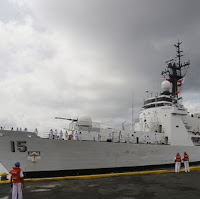According to Energy undersecretary Jose Layug, the Philippines are planning more oil and gas exploration in the disputed Scarborough Shoal region of the South China Sea. In an interview with ABS-CBN Layug said: "The Chinese are claiming [these areas] but we have said repeatedly that [they are] well within the territorial jurisdiction of the Philippines."
The news comes amid accusations that Beijing is employing "bullying" tactics. According to the Philippines on Saturday 8 April, China allegedly deployed a ship dangerously close to two Philippine vessels in the disputed South China Sea. In the alleged incident a Chinese vessel speeded past two Philippine coast guard ships at more than 37 km per hour, creating a high wave that buffeted the vessels.
No one was hurt but according to foreign department spokesman Raul Hernandez this move by “the Chinese vessel posed a danger to the Philippine vessels". He added: "Our ships did not react to the bullying.”
This latest incident is the most serious since the standoff began on 8 April, when the Philippines tried to arrest Chinese fishermen in the shoal for poaching and were blocked by Chinese ships. China has warned the Philippines against internationalising the conflict over the disputed area, about 230km from the Philippines' main island of Luzon. Experts fear that the on-going conflict may destabilise regional security.
China has territorial disputes with the Philippines, Vietnam, Brunei, Malaysia and Taiwan across the South China Sea, and these nations are worried about what some see as growing Chinese assertiveness in staking claims over the sea's islands, reefs and shoals.
Sources: Rigzone, AFP, Reuters



